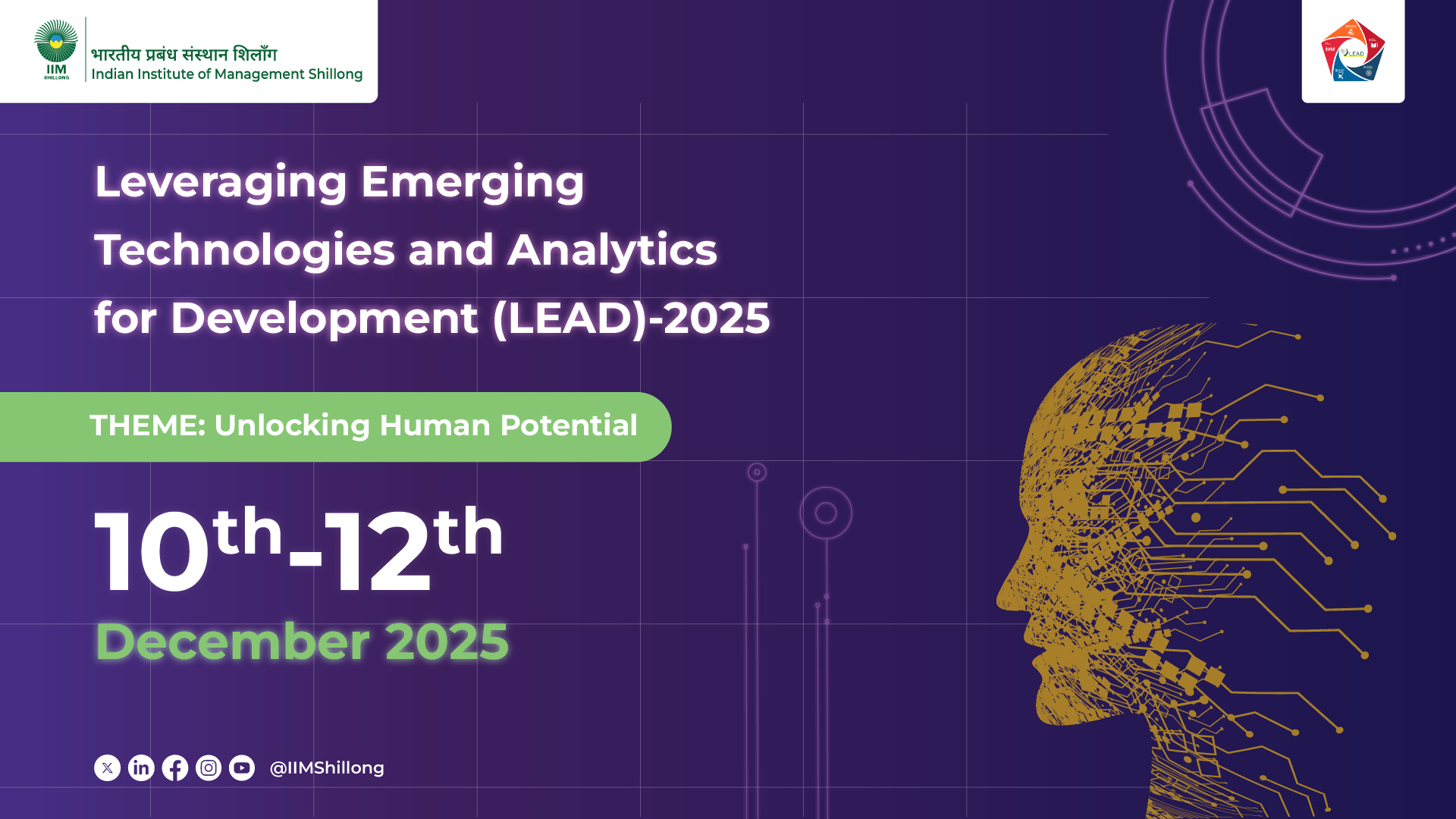
Theme: Unlocking Human Potential
(10th – 12th December, 2025 )
The Leveraging Emerging Technologies and Analytics for Development (LEAD)-2025 is a premier international conference bringing together scholars, industry leaders, policymakers, and innovators to explore the transformative power of technology and analytics. This year’s theme, “Unlocking Human Potential,” highlights the role of emerging technologies, artificial intelligence, data-driven decision-making, and digital transformation in enhancing human capabilities, fostering inclusive growth, and driving sustainable development. As businesses and societies navigate rapid technological changes, this conference aims to spark insightful discussions on harnessing these advancements for economic progress, social empowerment, and ethical innovation.
LEAD-2025 will feature keynote speeches, panel discussions, hands-on workshops, and paper presentations by leading experts from academia and industry. The conference will delve into critical topics such as AI-driven workforce augmentation, the ethical implications of automation, the intersection of human cognition and machine intelligence, and the use of analytics in public policy and business strategy. Special sessions will address the role of digital ecosystems in enhancing education, healthcare, financial inclusion, and governance. The event will provide actionable insights into leveraging technology to maximize human creativity, productivity, and well-being by fostering cross-disciplinary dialogues and real-world case studies.
Participants can engage in networking sessions, collaborative research discussions, and industry-led innovation showcases, ensuring meaningful ideas and best practices exchanges. The scenic setting of IIM Shillong, surrounded by the lush landscapes of Meghalaya, offers an inspiring environment for intellectual engagement and interdisciplinary learning. As a platform for thought leadership, LEAD-2025 is set to shape the future of how emerging technologies and data analytics can empower individuals, businesses, and societies to reach their full potential.
Click Here to download
Click Here to download
LEAD-2025 aligns with the United Nations’ Sustainable Development Goals (SDGs) by addressing critical global challenges through technology, data analytics, and innovation. By fostering interdisciplinary discussions, research collaborations, and real-world applications, the conference will contribute significantly to the following SDGs:
SDG 1: No Poverty
LEAD-2025 will explore how financial technology (fintech), AI-driven microfinance, and data-driven policymaking can enhance economic inclusion for marginalized communities. Sessions on poverty alleviation through digital transformation will highlight innovative solutions such as mobile banking for the unbanked, AI-based credit assessment models, and blockchain for transparent social welfare distribution. The conference will facilitate knowledge sharing on how analytics can optimize resource allocation and social impact measurement for poverty reduction initiatives.
SDG 4: Quality Education
By emphasizing AI-driven personalized learning, digital classrooms, and edtech innovations, the conference will showcase how technology can improve educational accessibility and learning outcomes. Key discussions will focus on using adaptive learning platforms, virtual reality (VR) in education, and AI-powered skill development programs to bridge the digital divide. Experts will also discuss strategies for upskilling and reskilling the workforce to prepare them for the future of work in an AI-driven world.
SDG 9: Industry, Innovation, and Infrastructure
The conference will drive discussions on smart infrastructure, AI-powered industrial automation, and digital transformation strategies that foster sustainable economic growth. Case studies on Industry 4.0, IoT-enabled manufacturing, and blockchain applications in supply chain management will highlight how businesses can adopt emerging technologies to enhance efficiency and resilience. Startups and researchers will also be able to showcase innovative solutions that can drive sustainable industrialization.
SDG 16: Peace, Justice, and Strong Institutions
By addressing the role of technology in governance, cybersecurity, and ethical AI, LEAD-2025 will contribute to building transparent, inclusive, and accountable institutions. Sessions on data-driven policymaking, AI for legal decision-making, and blockchain for anti-corruption initiatives will explore how technology can promote justice and trust in public administration. Discussions on AI ethics, misinformation detection, and regulatory frameworks will also emphasize the need for responsible and fair AI governance.
SDG 17: Partnerships for the Goals
LEAD-2025 will be a global platform for collaboration among academia, industry, government, and international organizations. The conference will enable the co-creation of technology-driven solutions for sustainable development by fostering cross-sector dialogues, research partnerships, and industry-academia collaborations. Panel discussions on public-private partnerships (PPPs), AI ethics coalitions, and data-sharing initiatives will highlight how collective efforts can drive meaningful progress toward the SDGs.
The conference will feature keynote presentations, paper presentations, industry and academic panel discussions, pre-conference workshops, and tools/application demonstrations.
Researchers, academics, industry professionals, policymakers, students, and other stakeholders interested in the application of emerging technologies for unlocking human potential.
The conference provides a global platform for engaging in dialogues and deliberations. Papers are welcomed for the following topics (not limited to):

Dr. Viswanath Venkatesh is an Eminent Scholar and Verizon Chair of Business Information Technology at the Pamplin College of Business, Virginia Tech.
He is involved with a number of organizations, advising them on their strategic directions. He has travelled across the globe and presented to the academic and business community. He also currently serves as an affiliate faculty at Virginia Tech India. He is widely regarded as one of the most influential scholars in business, both in terms of premier journal publications and citations, with about 220,000 citations per Google Scholar and an h-index of 100.

Indranil Bose is Distinguished Professor of Information Systems at NEOMA Business School. He has been a faculty member at the Indian Institute of Management Ahmedabad (IIMA), Indian Institute of Management Calcutta (IIMC), University of Hong Kong, University of Florida, and the University of Texas at Arlington. He was the Founder of the Case Research Centre at IIMC and led as its Coordinator from 2012-2020. He was also the Founding Chairperson of the Post Graduate Diploma in Business Analytics (PGDBA), Co-ordinator of the MIS group, and Advisor of Analytics at the State Bank of India.

Subodha Kumar is the Paul R. Anderson Distinguished Chair Professor of Statistics, Operations, and Data Science and the Founding Director of the Center for Business Analytics and Disruptive Technologies at Temple University’s Fox School of Business. He has a secondary appointment in Information Systems. He also serves as the Concentration Director for Ph.D. Program in Operations and Supply Chain Management. Prof. Kumar’s personal page can be accessed at: https://sites.temple.edu/subodha/.

Prof Ashish Kumar Jha is a Professor in Business Analytics at Trinity Business School, Trinity College Dublin. He is the Subject Area head for Business Analytics and Operations Area. He is the founding Director of M.Sc. in Business Analytics at Trinity Business School (ranked in top 30 in world) and Director of Trinity Centre for Digital Business and Analytics. He has published papers in top journals of the field like Journal of MIS, Journal of the AIS, Decision Support Systems, Information and Management, IEEE Transactions on Engineering Management, Decision Sciences etc. He is an associate editor for European Journal of Information Systems and Information & Management. He reviews for multiple journals and conferences of the field. Ashish has worked in India, France and Ireland and delivers guest lectures and invited talks across the world. He works very closely with industry partners and conducts executive training programs. He provides corporate training to boards across the world looking for AI led innovation. He is currently working with Dublin City Council and NewsCorp Group on their AI implementation. Ashish has supervised many PhD and postdoctoral students in past and successfully placed them in leading firms and schools in the world
https://www.linkedin.com/in/ashishkjha/?originalSubdomain=ie
https://www.tcd.ie/business/research/the-trinity-centre-for-digital-business–analytics/our-team/akjha/

Dr Baidyanath Biswas is an Assistant Professor in Business Analytics at Trinity Business School. Before joining Trinity, he was an Assistant Professor at the DCU Business School, Ireland. Dr. Baidyanath received his PhD in Information Systems (cybersecurity) from the Indian Institute of Management Lucknow (2019), and his Bachelors in Electronics Engineering from the Bengal Engineering and Science University in India (2005). Baidyanath’s research focuses on business analytics, cybersecurity and IT risk management. His work has appeared in several reputed management journals. Baidyanath is passionate about teaching and has teaching experience at the undergraduate and masters levels. He has previously taught a broad array of modules including Business Analytics, Total Quality Management, E-commerce, Digital Ecosystems and Information Systems Management. Before joining academia, Baidyanath worked for nine years with Infosys and IBM as a mainframe and DB2 specialist.
https://www.linkedin.com/in/baidyanath-biswas-47604635/?originalSubdomain=ie
https://www.tcd.ie/business/people/faculty-professors/biswasb/

Dr. Sujeet K. Sharma is Dean (Research & PhD Programmes) and Professor in the Decision Science & Information Systems area at IIM Nagpur. He has over 23 years of academic experience across India, Oman, and Bahrain, previously serving at IIM Tiruchirappalli, Sultan Qaboos University (Oman), and Birla Institute of Technology (Bahrain). His research interests include Blockchain, Artificial Intelligence, social media, e-Services, and IT for Disaster Management. Dr. Sharma has published over 40 international journal articles (ABDC/ABS ranked) and has more than 10,100 citations (Google Scholar; h-index: 32). His work appears in reputed outlets such as Information Systems Journal, Government Information Quarterly, Technological Forecasting & Social Change, and Communications of AIS. Dr. Sharma serves as Editor-in-Chief of the Journal of Systems and Information Technology and holds editorial roles with Communications of AIS, Information Systems Frontiers, and Information Systems Management. He has chaired international conferences, including IFIP WG 8.6 (2020, 2023) and served as Track Chair at ICIS 2023. He is currently President of the AIS India Chapter.
https://www.linkedin.com/in/professor-sujeet-k-sharma-64679a32/?originalSubdomain=in

Anuragini Shirish is a full Professor at Institute Mines-Télécom Business School, France. She has also completed her habilitation à diriger des recherches (HDR) from Université de Strasbourg, France. She is an elected member from her institution for the governance of the LITEM (Laboratoire Innovation Technologies Économie et Management) (EA 7363), a joint research laboratory under the University of Paris-Saclay, France. Her research focuses on studying the humanistic and instrumental impacts of several socio-technical phenomena in the broad areas of digital work, digital innovation and digital society. Her research has been published in international refered journals including the Journal of Management Information Systems (JMIS), European Journal of Information Systems (EJIS), Information Systems Journal (ISJ), Journal of Association for the Association of Information Systems (JAIS), Communications of the Association of the Information Systems (CAIS) and International Journal of Information and Management (IJIM), among others. She has also presented her work in several premier IS and management conferences including the International Conference on Information Systems (ICIS), the Academy of Management (AOM), Pacific Asia Conference on Information Systems (PACIS), and the Americas Conference on Information Systems (AMCIS), among others. She has been honoured with several awards including the “Outstanding Educator Award” by the Association for Information Systems (AIS) women’s network. She serves as an Associate Editor at the European Journal of Information Systems and serves as a mentor at Junior Faculty consortium and doctoral consortiums. She was recently recognized as a Distinguished Member Cum Laude by AIS and awarded the Best Paper at JAIS for the year 2023
https://www.linkedin.com/in/anuragini-shirish-054012b/?originalSubdomain=fr

Mr. Anil Rao M is a seasoned Information Technology professional with over 33 years of diverse experience across enterprise technology management, IT services, product engineering, and digital transformation. He held leadership roles on both the solution provider and buyer sides, working closely with global CXOs, technology startups, enterprises, and government organizations.
Mr. Rao brings a unique blend of industry and public sector experience, having worked alongside senior civil service officers in the Government of Karnataka under the Indian Administrative Fellowship at the/Nudge Institute, as well as serving as Global CIO at Sun Pharma and Delivery & Operations Head at a leading global IT services organization. Throughout his career, he has successfully led large-scale projects and transformational programs focused on business impact, customer and employee experience, delivery assurance, software engineering, technology operations, and continuous improvement. His leadership is grounded in strategic execution, measurable outcomes, and operational excellence. Beyond his corporate contributions, Mr. Rao is passionate about coaching and developing people and teams, as well as pursuing management research to advance technology-led organizational growth.

Nupoor Singh is a Senior Editor at Springer Nature, and handles acquisition and publication of Springer books from South Asia & Middle East region, related to Business & Management, Economics, Finance, Law, Applied Statistics, Policy & Governance, and International Relations. She is also the Social Media handler from Asia‐Pacific of Springer’s official account for X (formerly Twitter) and FB (now Meta), in her discipline. She has been associated with the publishing industry for about 20 years. She has worked with Indian publishing houses like Thomson Press and international publishers like John Wiley & Sons before joining Springer. Nupoor was responsible for publication of about 15 journals of John Wiley & Sons in her earlier appointment. She was handling publishing of about 12 Springer journals till 2018 before moving on to the Springer book programme. She has overseen publication process of about 400 Springer scholarly books since 2013. As a member of Springer Nature’s Research Integrity Group, ensuring ethical compliance are part of her core responsibilities while publishing cutting edge research on the topics handled by her.

Prof. Kirankumar S. Momaya is a Professor at Shailesh J. Mehta School of Management, I.I.T.Bombay and Editor-in-Chief, International Journal of Global Business and Competitiveness (JGBC), Springer. He is a pioneering competitiveness professional with experiences of taking Competitiveness Lab/Groups to leading positions in India & Asia. He has diverse and rich experiences of growing in India, Japan and North America through cooperation with relevant professionals. Key objective of our Group on Competitiveness (GoC) at IITB is to nurture conscientious professionals keen to take next level challenges of capability building for more sustainable firms or organizations. We study competitiveness enablers of firms, with a special interest in emerging country multinationals (EMNEs) keen to climb the ladder of “stages of competitiveness”. We are exploring role of international and innovation capabilities for export competitiveness.

Gayathri Devi Jayan is one of India’s senior voices in applied AI deployment, AI talent ecosystems, and enterprise AI strategy with two decades of experience across consulting, product ecosystems, and digital transformation programs. She has led multi-industry engagements working with BFSI, healthcare, manufacturing and Gov Tech programs to embed AI into business workflows. She founded AIDVICE as an AI-focused strategy and advisory firm that supports enterprises in responsible AI adoption, algorithmic governance, and AI-readiness assessments. As President of the Applied AI Association of India she drives national-level initiatives on AI workforce development, policy consultation, and industry standards. Her association collaborates with state governments, NASSCOM members, and industry bodies on AI literacy, data ecosystems, and risk management frameworks. Her thought leadership focuses on practical AI not hype talent scarcity, ethical deployment, regulatory guardrails and the economics of enterprise AI. Her area of Specialisation includes AI Governance & Responsible AI, Enterprise AI Strategy & Operating Models, AI Upskilling, Workforce Transformation, MLOps Maturity, Large-Scale Rollouts and AI Readiness Assessments for Public & Private Sector.

Aneel Kumar Bonu is an HR Tech entrepreneur and worked in India’s talent transformation space. His company Talent Spotify builds intelligent hiring and workforce management platforms using behavioural analytics, predictive modelling, and AI-based competency mapping. The focus is on helping organisations reduce hiring friction, enhance predictability of talent performance, and automate large parts of the employee lifecycle. As Chairperson of GHRMODC he leads a national-level network of CHROs, HR transformation leaders, and organizational psychologists guiding best practices on agile HR models distributed leadership frameworks, and digital skilling. He frequently works with large corporates on leadership development architectures and has delivered advisory for workforce restructuring and future-skills programs. His areas of excellence include HR Technology Architecture, Predictive Talent Analytics, Competency Modelling & Workforce Design, Organizational Development & Leadership Pipelines and AI in Hiring & Employee Lifecycle.

Partha Sengupta serves as the Senior Vice President and Head of IT Shared Services (ITSS) at ITC Ltd where he leads the company’s enterprise-wide IT infrastructure, digital systems, cybersecurity, and shared service operations across multiple business verticals such as FMCG hotels, agribusiness, and manufacturing. With a career spanning various senior roles within ITC including Manager and Senior Manager of IT Security, General Manager & Head of ITSS, and Vice President (I3L) & Head of ITSS, he has played a pivotal role in modernizing the organisation’s IT landscape driving initiatives in virtualization, data-centre consolidation, mobility solutions, and secure digital transformation. Known for his expertise in information security, server and storage management, network infrastructure, and cloud frameworks he regularly contributes to industry forums and IT conclaves as a speaker and thought leader representing ITC’s technology vision and digital advancement

Priyam Seth is a finance-technology leader who has worked at the core of India’s capital market infrastructure. As a Product Manager at BSE he was involved in designing market systems, compliance tools, and technology infrastructure supporting trading efficiency. His work focused on the interface of market microstructure, regulatory requirements, and trading technology. He founded Aspire AI to build AI-driven solutions for BFSI particularly around fraud detection, compliance automation, client risk scoring, and algorithmic intelligence for financial institutions. His company works with trading firms, NBFCs, and brokers to build AI workflows that improve decision-making and reduce operational risk. His area of expertise includes Market Infrastructure Technology, AI for BFSI (fraud, risk, compliance), Trading Systems & Analytics, Regulatory Technology (Reg Tech) and Financial Modelling & Market Microstructure.
Type of Submissions:
LEAD-2025 invites academicians, research scholars, and corporate/industry executives to submit Full paper (Research Paper (Qualitative / Quantitative/ Mixed Methods), Literature Review, Case Study, Conceptual paper, Tools demo paper). Authors wishing to submit multiple papers will have to do separately.
Author Guidelines:
All papers must be original and not previously submitted for any other conference or journal. Authors must follow the Springer Conference Format while preparing their manuscript. A Manuscript must have a minimum of 5000 words, excluding abstract and reference list. The similarity of the text must not exceed 10% (including similarity in literature review). Each manuscript must explicitly mention the manuscript’s contribution to the conference proceedings titled ‘Leveraging Emerging Technologies and Analytics for Unlocking Human Potential’.
Review Process:
Submitted papers will undergo a double-blind peer review process (no author name is to be included in manuscript) based on relevance, originality, significance, and clarity. Authors will be notified of revision/ acceptance/ rejection by the specified deadline.
Mode of presentation
LEAD-2025 will be conducted in hybrid mode. Indian authors will present papers physically at the IIM Shillong Umsawli campus. International participants may present their papers online. Each accepted paper should be presented in the conference for receiving the quality feedback.
| Last date for Full Paper Submission | 31st August, 2025 |
| Final Decision on Full Paper Submission | 30th September, 2025 |
| Last Date for Extended Abstract Submission | 31st October, 2025 |
| Final Decision on Acceptance/Rejection of full paper | 15th Nov, 2025 |
| Registration Link Opens | 1st October, 2025 |
| Participants | Amount |
|---|---|
| Corporate/Industry | ₹8000 |
| Academicians | ₹6000 |
| Research Scholars | ₹4000 |
| International (Developed Countries) | $100 |
| International* (Least Developed Countries) | $25 |
* https://www.un.org/development/desa/dpad/least-developed-country-category/ldcs-at-a-glance.html
The Registration Fees include morning and afternoon Tea for two days, Lunch and dinner for two days, along with Conference Kit, but does not include accommodation. The participants will have to make their own arrangements for accommodation.
The institutes expressed interest in being part of LEAD-2025 are:
Publication of Conference Proceedings: LEAD-2024 Conference Proceedings (Vol-1) is available at: https://link.springer.com/book/9789819625475.
LEAD-2025 Conference Proceedings: The accepted, registered and presented full papers at LEAD-2025 conference will be included in the conference proceedings by Springer in its SCOPUS-Indexed book series titled “Springer Proceedings in Business and Economics (https://link.springer.com/series/11960).
Published LEAD-2024 Conference Proceedings:
Communication of Extended Papers to Journals: The following journals accepted to consider the extended versions of your presented papers for their issues. The review process is as per their norms.
Conference Email: leadconf@iimshillong.ac.in
Conference Website: https://www.iimshillong.ac.in/events-and-conferences/conferences/lead-2025
Phone no.: 0364-2308027
Address: Indian Institute of Management Shillong, Umsawli, Shillong, 793018, Meghalaya, India
About IIM Shillong
IIM Shillong, the seventh IIM in India, has been set up with a vision to become an internationally recognized Management Institute with a Global outlook grounded in Indian values. From its inception, it has been constantly working towards a lofty mission to generate and disseminate knowledge in all aspects of management education with a focus on Sustainability and building innovative leadership.
Travelling to Shillong
Surrounded by verdant hills, Shillong offers a beautiful panoramic view of the graceful scenic countryside. Shillong can be reached by taxi from Guwahati airport/railway station, which is about120 km away. Guwahati airport is well connected to many major cities in India including Bangalore, Chennai, Delhi, Mumbai, and Kolkata. Helicopter services are also available between Guwahati and Shillong. Shillong is connected to Assam, Manipur, Tripura, West Bengal and New Delhi through direct flights.